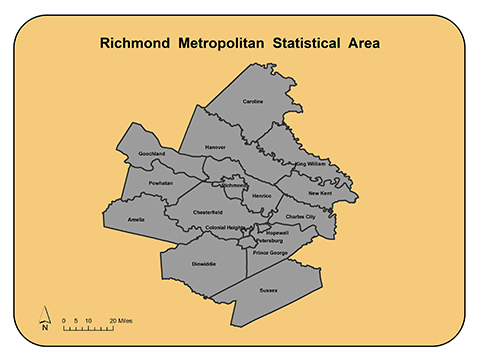Metro Richmond Exports Initiative
 The Metro Richmond Exports initiative is an effort to help businesses in the Richmond Metropolitan Statistical Area (MSA) start, or increase their exports abroad. The map shows the geographic extent of the initiative. Read the final document, which was released on September 8, 2016.
The Metro Richmond Exports initiative is an effort to help businesses in the Richmond Metropolitan Statistical Area (MSA) start, or increase their exports abroad. The map shows the geographic extent of the initiative. Read the final document, which was released on September 8, 2016.
A summary of the efforts of MREI in its first year of operation showcasing the initiative's purpose, strategy, and results can be found in Metro Richmond Exports Initiative Annual Report (2017)
Why is this initiative needed?
Growing the regional economy by recruiting branch plants is no longer sufficient. We need new approaches to growing the region’s economy. One of these is exports.
Exporting is good for businesses and good for the regional economy. Companies that export become more innovative, enjoy higher market value and pay their workers higher wages than non-exporting companies in the same industries. But Richmond, like many U.S. regions, exports below its potential and ranks below average among metropolitan areas nationwide in exports.
Many companies don’t know how to export or are fearful of trying. Although the Richmond region has many export service providers, companies often don’t know how to find them.
This initiative will take the mystery out of exporting, align service providers and help companies find and use them to become successful exporters.
Who is participating?
Coordinators:
CURA @ VCU
Greater Richmond Partnership (GRP) – Hanover, Henrico, Chesterfield, Richmond
Virginia’s Gateway Region – Chesterfield, Colonial Heights, Hopewell, Petersburg, Dinwiddie, Prince George, Surry, Sussex
Virginia Economic Development Partnership
Supporters:
JPMorgan Chase
Brookings Institution
Advisors:
United Parcel Service, Fed Ex Corporation, K-Line America, Inc., DHL Express, Richmond Regional Planning District Commission, Crater Planning District Commission, US Commercial Service, US Small Business Administration, Small Business Development Center, Richmond International Airport, Community College Workforce Alliance, Virginia Port Authority, Virginia Bio Tech Park, VCU School of Business, Virginia Department of Agriculture, Federal Reserve Bank of Richmond, Virginia State University, Metropolitan Business League, RichTech, Virginia Council of CEOs, GenEdge Alliance, Retail Merchants Association, Virginia Manufacturers Association, Virginia International Business Council, Virginia Maritime Association, Greater Richmond Chamber, Chesterfield County Chamber, Henrico County Business Leaders, Petersburg Chamber, Hopewell Chamber Dinwiddie County Chamber, Colonial Heights Chamber, Virginia Hispanic Chamber, Virginia Asian Chamber, Hanover Chamber, Hanover Airpark Association, Company Graduates of the VEDP VALET Program.
Key steps in the process
June 2014: GRP launches the Richmond Exports Initiative
August 2014: GRP and CURA @ VCU partner to promote exports in the Richmond MSA. Core group of CURA, GRP, Virginia’s Gateway Region, Virginia Economic Development Partnership and U.S. Commercial Service formed over following year.
January 2015: JP Morgan Chase provides a grant to CURA @ VCU to support research and planning activities. Brookings Institution offers technical support.
April 2015: Metro Richmond Exports Kick-Off Breakfast at Commonwealth Club, featuring Virginia Secretary of Commerce and Trade Maurice Jones and Brookings Institution Global Cities Director Marek Gootman.
April-September 2015: Fact-finding by CURA @ VCU – Analysis of exporting, export service providers, metrics, other Export Initiatives in the U.S., experiences of seasoned Richmond-area exporters and identification of needs for local firms that do not currently export.
October 2015: CURA @ VCU reports and discusses results of fact-finding with stakeholders, and proposes plan for development of regional export strategy.
November 2015 – February 2016: Draft plan developed: 12 focus groups with regional stakeholders, SWOT (strengths, weaknesses, opportunities, threats) analysis, other communities in U.S. further studied.
March 2016: Report-out of planning and development work to area stakeholders.
March-May 2016: Development of implementation plan with benchmarks.
June 2016: Third report-out, this one focusing on export stimulation plan implementation and benchmarking. Benchmarks established.
June 2017 and each year thereafter: Monitoring of progress of Export Initiative on key benchmarks.
How you can get involved:
Tell us what you think about exporting and export services. Tell us what the region needs and where you think we should focus our efforts. Get on our mailing list here: CURA@vcu.edu or GFesta@grpva.com.
Richmond’s Artisan Economy
Richmond’s Artisan Economy tracks the growth and development of this new, dynamic sector of the economy. Artisans serve the growing demand for high-quality, unique goods and consumables, and their presence and activities are revitalizing and enlivening neighborhoods in the city and other areas.
In collaboration with the Master of Urban and Regional Planning program’s Urban Commercial Revitalization class, CURA is producing an annual report on the state of the artisan economy, and focusing attention on removing barriers that may limit the ability of this important sector of the economy to thrive and grow.
Reports produced to date cover the following artisan industry segments:
- Bakeries
- Barbershops
- Bicycle shops
- Breweries
- Cideries
- Coffee roasteries
- Crafts (jewelers, muralists, hand-letterers)
- Distilleries
- Fashion (clothiers)
- Food trucks
- Independent media
- Wineries